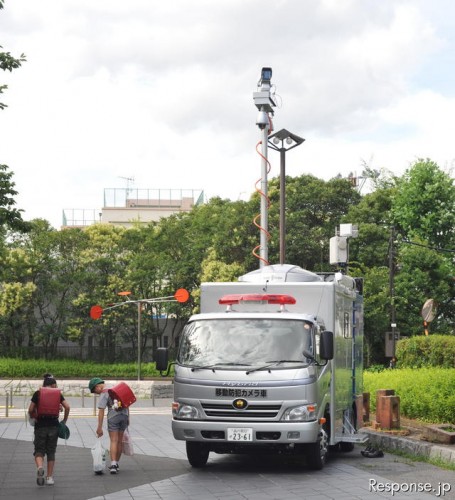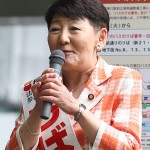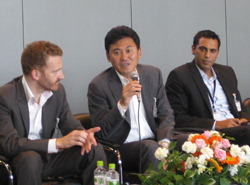That’s the Commonwealth of the Northern Mariana Islands, easily the most-forgotten corner of the United States.
The CNMI is a chain of fifteen islands (only three of which–Saipan, Tinian and Rota–are significantly populated) stretching north of Guam toward Japan. These islands started out sovereign life as part of the Spanish empire along with Guam and the Philippines, but were sold to Germany at the end of the Spanish-American War, were ceded to Japan under the Treaty of Versailles, and were forcibly taken over by US forces in 1944.
After World War II, the Japanese mandates in Micronesia were placed under American trusteeship pending final resolution of their status. Unlike the other trust territory islands in Micronesia, such as Yap and Palau, the CNMI islands ultimately opted against independence and chose to stay in the United States, albeit in a quasi-independent state. The Northern Mariana Islanders are all US citizens, subject to US federal court jurisdiction, have a non-voting representative in the US Congress and receive a number of federal benefits, but pay no federal income taxes and have a separate customs zone (immigration control was also initially separate but is now integrated). American “expats” in the islands generally describe the local government as immensely corrupt, and there is a verbose website called Saipan Sucks which devotes itself to this topic.
Even to a casual visitor, the CNMI seems like a bizarro United States on many fronts:
- There are no flights to the CNMI from anywhere in the United States except Guam, so getting there from the US mainland requires a stop in Japan or Korea, unless you want to backtrack through Honolulu and Guam on domestically-configured planes.
- Television gets broadcast from Guam, which houses affiliates for the major US networks. American TV shows are shown in their normal mainland time slots, but since Guam and Saipan are on the other side of the International Date Line from the rest of the US, everything comes out a week late, including (to my surprise) network newscasts. The only way to get up-to-date TV news on the islands is to watch the extremely local news, where a shut-down stoplight is often the top story, or to watch cable or satellite.
- Although the official language is English, many stores only have signs in Japanese, Chinese, Korean or Russian. Newspapers, TV and radio stations sometimes spontaneously switch over to Tagalog or the indigenous Chamorro language. (I was somewhat surprised to discover, while driving around, that there is a Tagalog cover of “Hotel California.”)
The most crippling oddity of the CNMI is probably its property law. Only ethnic islanders are allowed to own property on the islands; everyone else has to lease it, including other US citizens. Islanders can get a parcel of property apportioned from the government provided that they build something of minimal permanence on it. The result is that the three main islands are dotted with tiny homesteads, typically consisting of a hastily-constructed shanty, a parked car and a couple of livestock. There are some nicer homes around, as well as large resort hotels catering to mostly-Asian visitors, but most of the archipelago resembles a forgotten corner of Latin America. (In contrast, Guam resembles nothing so much as northern Florida, with its combination of high-rise hotels, big-box stores and military brats.)
For a while, the CNMI economy was boosted by sweatshops that could produce cheap goods “made in the USA,” as the CNMI was exempt from most federal labor laws. This trade has died down in recent years as federal regulation has become stronger in the islands and less-regulated foreign labor markets like China have become more accessible.
The remaining big business in the islands is tourism. Saipan, the largest island in the chain, has daily flights to Tokyo, Osaka, Nagoya and Seoul (all 3-4 hours away) as well as less regular flights to China, and is noted for its spectacular scuba diving locations, as well as cheap golf courses and some interesting World War II historical sites. The neighboring island of Tinian (where the Enola Gay was based for its A-bomb missions) has a casino intended to squeeze money out of Asian tourists.
But since the mid-90’s or so, the situation on these islands has been pretty pathetic: shops and even entire malls built in Saipan during the Japanese bubble now stand derelict and abandoned, and the Tinian casino (pretty much the only tax generator on the entire island) only manages to cover half of the island’s government budget. The CNMI government is constantly teetering on the brink of sovereign bankruptcy and has had to delay salary payments several times recently. Unlike Guam, which has functioned as a giant aircraft carrier for decades (and which has budgetary problems of its own), the CNMI has no US military presence other than a few National Guard members and three permanently-anchored civilian supply ships offshore, supposedly at the ready for future military actions in East Asia. And although the island of Tinian has been conceived (by certain Japanese lawmakers, at least) as a place to pick up some of the Marines to be relocated from Futenma Air Base in Okinawa, those plans are still nowhere near finalized.
・ ・ ・
So I supported the tourist economy by visiting Saipan for a week with Mrs. Jones. No diving and no golf; either sounded like too much effort to her.
Reason #1: She wanted to go to a tropical beach destination, and I had a pocketful of Delta SkyMiles which wouldn’t get us to anywhere more fitting of that description (except for the giant aircraft carrier of Guam, which is not quite as interesting).
Reason #2: I have a couple of law school friends who practice in Saipan. The CNMI seems to have an unusual number of lawyers per capita, even in comparison to other parts of the US, probably due to its high government:citizen ratio. Since there are no local law schools, pretty much all of the lawyers have to be “imported” from the mainland, and since the CNMI legal system is integrated with the rest of the United States, American lawyers can get locally licensed fairly easily, just by passing a standard multistate bar examination which includes a question on local law.
In fact, my first real intellectual contact with the CNMI came from law school: specifically Matthew Wilson, the former head of Temple University Japan’s law program. Wilson started his legal career in Saipan as a summer associate at a law firm there, and that experience jump-started his career as a civil litigator, in-house lawyer and law professor, as well as a standardized pep talk on “Distinguishing Yourself” which he gave at many American law schools as part of marketing the Temple study abroad program in Tokyo. Thanks largely to Wilson’s presence at TUJ, law students there had a good open door to the CNMI legal market.
Reason #3: The Sunday brunch at the Hyatt Regency, fabled among island travelers for its opulence: a huge buffet featuring caviar, sushi, oysters, roast beef and pork, breakfast food of various nationalities, practically every kind of dessert imaginable, and (most importantly) bottomless champagne. I enjoyed this once on a short visit to the island a couple of years ago and really wanted to have it again.
Reason #4: They recently got a Taco Bell franchise. As most Americans in Japan quickly figure out, there is no Taco Bell here unless you are on a US military base, so the prospect of enjoying the cheap crappy Mexican food that I regularly enjoyed in high school was pretty exciting.
Most of the tourists around us were either Japanese or Korean, in what seemed like roughly equal numbers. Chinese and Russian tourists also appeared from time to time, but mainland Americans were few and far between: as far as I could tell, the only other Americans in our hotel were either married to Asians or members of a Delta flight crew on layover.
There was a sizable influx of mainlanders toward the end of our stay, when a training ship from a maritime academy in California pulled into port and its cadets came out for shore leave. They quickly colonized a restaurant where we were having lunch, and we got to overhear them (a) learn what shochu is and (b) argue about whether US dollars are legal tender in Japan (apparently their next port of call).
Was the trip worth it? Totally. For someone based in urban East Asia, the CNMI is a very convenient place to visit for a few days of relaxation. One has to wonder, though, how long these islands will last as part of the US, and how they will build an economic and political future for themselves.



 Chiba, a notably liberal member of the Diet, was appointed to Minister of Justice under Prime Minsiter Hatoyama last year, but lost her seat for reelection in Kanagawa Prefecture where she had held the seat since 1986. She was most likely defeated because activists targeted her for her liberal views, which include allowing foreigners to vote in local elections, allowing separate family names for men and women after marriage, and refusing to enforce the death penalty. She is to be replaced by Kenji Nakanishi, a former director of JP Morgan in Japan, who ran as the candidate of the upstart reformist “Your Party.”
Chiba, a notably liberal member of the Diet, was appointed to Minister of Justice under Prime Minsiter Hatoyama last year, but lost her seat for reelection in Kanagawa Prefecture where she had held the seat since 1986. She was most likely defeated because activists targeted her for her liberal views, which include allowing foreigners to vote in local elections, allowing separate family names for men and women after marriage, and refusing to enforce the death penalty. She is to be replaced by Kenji Nakanishi, a former director of JP Morgan in Japan, who ran as the candidate of the upstart reformist “Your Party.”

